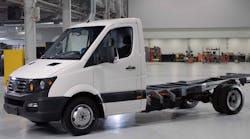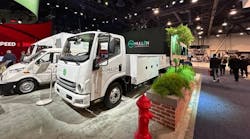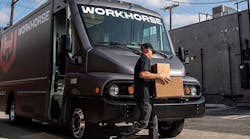Volvo Trucks this week introduced its first all-electric truck for commercial use – the Volvo FL Electric for urban distribution and refuse operations.
The company expects sales and series production of the new model to start next year in Europe.
“We’re immensely proud to present the first in a range of fully electrically powered Volvo trucks ready for regular traffic,” said Claes Nilsson, president of Volvo Trucks. “With this model, we are making it possible for cities that aim for sustainable urban development to benefit from the advantages of electrified truck transports.”
With better air quality and less noise in the city, it is possible to plan for housing and infrastructure more freely than at present. An electric truck without any exhaust emissions can be used in indoor terminals and environmental zones. Their low noise level creates opportunities for doing more work at night, thus reducing the burden on the roads during the day.
“In order to make the transition secure and smooth, we will offer holistic solutions based on each customer’s individual needs regarding driving cycles, load capacity, uptime, range and other parameters,” said Jonas Odermalm, head of product strategy for the Volvo FL and Volvo FE.
“Such a solution may encompass everything from route analysis and battery optimization, to servicing and financing. Volvo Trucks works closely with several suppliers of charging equipment. The aim as always is to offer customers high uptime and productivity.”
Backing the Volvo Trucks offer is the Volvo Group’s accumulated expertise in electrified transport solutions. Sister company Volvo Buses has sold more than 4,000 electrified buses since 2010. The technology used for propulsion and energy storage in the Volvo FL Electric was tried and tested from the outset, and supported by Volvo Trucks’ far-reaching network for sales, service and parts supply.
“From experience, we know how important it is that cities, energy suppliers and vehicle manufacturers cooperate in order for large-scale electrification to become a reality,” Odermalm said. “With attractive incentives, agreed standards and a long-term strategy for urban planning and expansion of the charging infrastructure, the process can go much faster.”
Volvo Trucks believes it’s essential to take a holistic view of electrification of the transport sector to handle the ongoing challenges in areas such as electricity generation and batteries.
The first trucks in the Volvo FL Electric range are now entering regular operation with customers in Gothenburg, Sweden, the home of Volvo Trucks.
“For instance, in order to ensure that raw materials for the batteries are extracted in a responsible way, the Volvo Group works with the Drive Sustainability network, which has a special function that monitors this issue,” Odermalm said. “The Volvo Group is also involved in various projects where batteries from heavy electric vehicles get a second lease of life, reused for energy storage.
“All the questions about handling of batteries have not yet been solved, but we are working actively both within the Group and together with other actors to drive development and create the necessary solutions.”
The Volvo FL Electric features a 185 kW electric motor, two-speed transmission, two to six lithium-ion batteries, totaling 100-300 kWh, a range of up to 300 km (186 miles) and a recharging time, from empty to fully charged, of one to two hours for DC charging, and up to 10 hours for AC charging.









